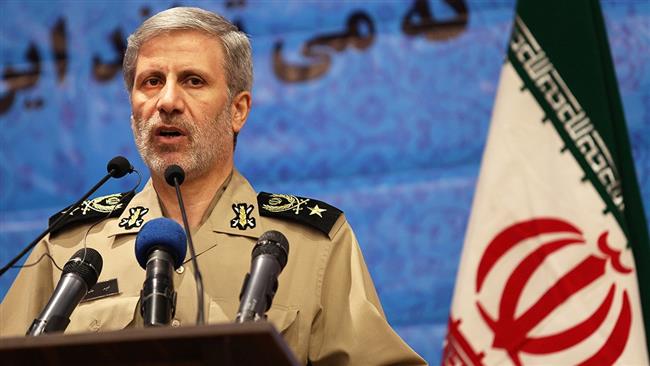

Iranian Defense Minister Brigadier General Amir Hatami has voiced the Islamic Republic’s opposition to any change in geographical borders in the Middle East and disintegration of regional countries.
In a Tuesday meeting with Turkish ambassador to Tehran, Reza Hakan Tekin, the Iranian defense minister warned of the security consequences of a controversial referendum on the independence of the semi-autonomous Kurdistan Region from Iraq’s central government.
“The Islamic Republic of Iran opposes any move, which will lead to a change in geographical borders and partitioning of regional countries,” Hatami said.
He added that Iran’s principled policy was to respect the national sovereignty and territorial integrity of regional countries, stressing that the plebiscite in the Kurdistan region “was tantamount to playing into the hands of Daesh terrorists and their regional and international allies.”
The Iranian minister emphasized that the independence vote would create problems for regional nations, particularly the Kurdish people in Iraq.
Iraq’s semi-autonomous Kurdistan Region held an independence referendum on Monday in the face of strong objections from the central government in Baghdad and urgent calls from the international community to scrap the vote.
The voting stations were dotted across the three provinces of Erbil, Sulaimaniyah and Dohuk that form the Iraqi Kurdistan Region as well as in the disputed bordering zones such as the oil-rich province of Kirkuk.
Iraq’s Kurdish-language Rudaw television network, which is affiliated to the Kurdistan Democratic Party (KDP) led by President of the Kurdistan Regional Government (KRG) Massoud Barzani, reported that the turnout in the Kurdish vote stood at 76 percent at 5:00 p.m. local time (1400 GMT) – one hour before polling stations closed. The final results were to be announced within 72 hours.
Major General Yahya Rahim Safavi, a top military advisor to Leader of the Islamic Revolution Ayatollah Seyyed Ali Khamenei, said on Monday that the highly controversial independence referendum was a new US-Israeli plot in the Middle East to partition the country, warning that the Kurds would suffer as a result of the plan.
“After the defeat of Daesh [terrorist group] in Syria and Iraq, Kurdistan’s referendum will result in escalation of tensions and crisis in the region,” Rahim Safavi said.
Elsewhere in his remarks, the Iranian defense minister commended the growing trend of political, economic and cultural relations between Iran and Turkey.
Hatami expressed hope that the continuation of consultations between the defense and political officials of the two countries would help further improve cooperation in mutual and regional fields.
The Turkish ambassador, for his part, said the unilateral decision made by officials of Iraq’s Kurdistan Region to hold the independence referendum was cause of concern and instability in the region.
Hakan Tekin said his country expected officials in the Iraqi Kurdistan Region to stop their one-sided measures, which were in violation of Iraq’s constitution, and, instead, solve the issue through goodwill.
Turkish President Recep Tayyip Erdogan on Tuesday warned the KRG president that pushing for independence risked sparking an “ethnic war” in the region.
“If Barzani and the Kurdish Regional Government do not go back on this mistake as soon as possible, they will go down in history with the shame of having dragged the region into an ethnic and sectarian war,” Erdogan said in a televised speech.
He also emphasized that all options, from economic to air and land military measures, were on the table in response to the Kurdish vote.
The Turkish president said that only the Israeli regime would recognize independence of the Iraqi Kurdistan Region.








